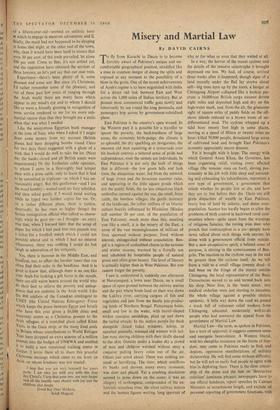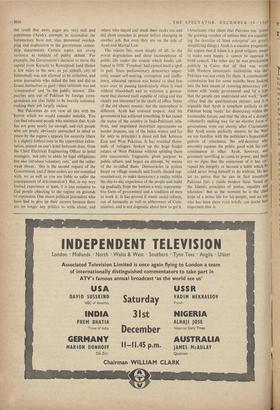Misery and Martial Law By DAVID CAIRNS po fly from
Karachi to Dacca is to become forcibly aware of Pakistan's unique and un- comfortable geographical position, straddled like a man in constant danger of doing the splits and exposed at any moment to the possibility of a blow in the groin. One of the recent achievements of Ayub's regime is to have negotiated with India for a direct rail link between East and West across the 1,000 miles of Indian territory. But at present most commercial traffic goes slowly and laboriously by sea round the long peninsula, and passengers hop across by government-subsidised plane.
East Pakistan is the country's open wound. In the Western part it is possible for a traveller to ignore the poverty, the backwardness of large areas, the economic birth-pangs; the climate is so splendid, the dry sparkling air invigorates, the meanest old man squatting at a crossroads over his hookah conveys a tattered sense of pride and independence, even the camels are individuals. In East Pakistan it is not only the look of things that is different—the low green hills and lush trees, the ubiquitous water, fed from the network of huge rivers and the ferocious summer rains, and appearing in the little square ponds which dot the paddy fields, the no less ubiquitous black umbrellas opened against the sun, the small, bony cattle, the bamboo villages, the gentle intimacy of the landscape, the softer outlines of an Islamic culture heavily influenced by Hinduism (Hindus still number 20 per cent. of the population of East Pakistan); much more than this, assailing you like a smell, it is the misery of the East, a sense of the vast meaninglessness of millions of lives spawned without purpose, lived without interest, extinguished without consolation. Ben- gal is a region of undoubted charm in the autumn and winter seasons, warmed by a friendly sun and inhabited by hospitable people of natural grace and often great beauty. The level of literacy is actually higher than in West Pakistan. But you cannot forget the poverty.
I saw it, understood it, suddenly one afternoon at Narayanganj, a town near Dacca, on a small space of open ground between the railway station and the pier where boats land on their way down the Lakhya river, carrying cargoes of fish and vegetables and jute from the fertile jute-produc- ing lands of Northern Bengal. Picturesque boats, small and low in the water, with barrel-shaped wicker canopies amidships, plied up and down the turbid stream: In the station people lay thick alongside closed ticket windows, asleep, or squatted patiently, wizened old women with hol- low eyes, staring children with their skulls shaved to the skin. Outside under a leaden sky a crowd of men and children watched without envy a conjuror pulling heavy coins out of the air. Others just stood about. There was nothing un- usual or horrifying. The river, which overflows its banks and drowns many every monsoon, was slow and placid. Yet a crushing desolation seemed to press down on the scene; it was an allegory of nothingness, compounded of the un- hurried, relentless river, the silent railway station and the human figures waiting, long ignorant of why or for what or even that they waited at all.
In a way, the horror of the recent cyclone and the details of the massive catastrophe it brought depressed me less. We had, of course, arrived three weeks after it.happened, though signs of a land recently under the flail lay strewn about still—big trees torn up by the roots, a hangar at Chittagong Airport collapsed like a broken pie- crust, a 10,000-ton British cargo steamer driven eight miles and deposited high and dry on the high-water mark, and, from the air, the gruesome sight of square miles of paddy fields on the off- shore islands reduced to a brown waste of un- differentiated mud. The cyclone whipped up a tidal bore twenty feet high in some places, moving at a speed of fifteen or twenty miles an hour, killed 50,000 people, devastated large areas of cultivated land and brought East Pakistan's economy appreciably nearer disaster.
Yet it brought with it hope. The energy with which General Azam Khan, the Governor, has been organising relief, visiting every affected village (the remoter ones on foot), slaving pas- sionately at his job with little sleep and astound- ing and exhausting his subordinates, represents a new type of government, a government that minds whether its people live or die, arid how they are to live before they die. There are still gross disparities of wealth in East Pakistan heavy loss of land by salinity, and dense over- population. Science has hardly begun to solve the problems of birth control in backward rural com- munities where—quite apart from the warnings of religious fanatics, the roving wise men who preach that contraception is a sin—people have never talked about such things with anyone, let alone with a government official from outside But a new co-operative spirit, a belated sense of purpose, is stirring in the consciousness of Ben- galis. The reaction to the cyclone may in the en( be greater than the cyclone itself. As we left from a visit to a small village (twenty dead—it had been on the fringe of the storm) outside Chittagong, the local representative of the Basic Democracies waved to us and turned back into his shop. Near him, in the `main street,' two medical orderlies were just starting to inoculate the whole village against a possible cholera epidemic. A little way down the road we passed a truck full of volunteer relief workers from Chittagong, educated, moderately well-to-do people who had answered the appeal from the government of Martial Law.
Martial Law—the term, as spoken in Pakistan, has a note of approval; it suggests common sense and energetic benevolence. A Western liberal, with his sheeplike insistence on the forms of free- dom, may come to Pakistan ready to find, and deplore, oppressive manifestations of military dictatorship. He will find some without difficulty; but he will not so easily find people to agree with him in deploring them. There is the close censor- ship of the press and the ban on `destructive criticism' (ominous phrase); newspapers have to use official handouts, report speeches by Cabinet Ministers at monotonous length, and exclude all personal reporting of government functions, with the result that news pages are very dull and repetitious (Ayub's attempts to rationalise the bureaucracy have not, alas, prevented overlap- ping and duplication in the government censor- ship department). Certain topics are streng verboten as subject i of public debate. For example, the Government's decision to move the capital from Karachi to Rawalpindi (and thence a few miles to the new, as yet unbuilt, city of Islamabad) was not allowed to be criticised, and some journalists who defied the ban and did so found themselves in gaol—their criticism was not 'constructive' and 'in the public interest.' Dis- patches sent out of Pakistan by foreign corre- spondents are also liable to be heavily censored, making their job largely useless.
But Pakistanis do not view all this with the horror which we would consider suitable. You can find educated people who maintain that Ayub has not gone nearly far enough, and rich people who are pretty obviously untouched in mind or estate by the regime's appeals for austerity (there is a slightly forlorn note in the typewritten exhor- tation, pinned on one's hotel bedroom door, from the Chief Electrical Engineering Officer to hotel managers, `not only to abide by legal obligations but also introduce voluntary cuts,' and the rather weak threat: `this is the second request of the Government, and if these orders are not complied with, we as well as you are liable to suffer the consequences of disconnection'). But, in my very limited experience at least, it is less common to End people objecting to the regime on grounds of repression. One meets political journalists who have had to give up their careers because there are no longer any politics to write about, and others who stayed and stuck their necks out and did short stretches in prison before changing to another job. But even they arc on the side of Ayub and Martial Law.
The reason lies, most simply of all, in the moral degradation and sheer incompetence of public life under the system which finally col- lapsed in 1958. `Freedom' had earned itself a spell in gaol. Since parliamentary democracy appar- ently meant self-seeking, corruption and ineffic- iency, educated opinion was bound to shed few tears over its passing (particularly when it went without bloodshed) and to welcome a govern- ment that showed itself capable of ruling and was clearly not interested in the spoils of office. Some of the old abuses remain; but the atmosphere is different. Ayub has restored respect. And his government has achieved something. It has raised the status of the country in Indo-Pakistani rela- tions, and negotiated important agreements on border disputes, use of the Indus waters and (so far only in principle) a direct rail link between East and West Pakistan. It has resettled thous- ands of refugees, broken up the huge feudal estates of West Pakistan without splitting them into uneconomic fragments, given purpose to public affairs, and begun an attempt, by means of the so-called Basic Democracies (a system based on village councils and locally elected rep- resentatives), to make democracy a reality within the day-to-day experience of the people and build up gradually from the bottom a truly representa- tive form of government and a tradition of men to work it. It has proved it wants social reform, out of humanity as well as abhorrence of Com- munism, and is not dogmatic about how to get it. (Americans who claim that Pakistan has Wined the growing number of nations that are repudiat. ing the doctrine of State enterprise' are greatlY simplifying things.) Ayub is a massive pragmatist. He argues that if Islam is a good religion, meant to make men happy, it cannot be opposed to birth control. The other clay he was proclaiming publicly in Cairo that all that was wrong with Western democratic institutidns was that Pakistan was not ready for them. A constitutional commission has for some months been looking into the best means of restoring democracy oon- sistent with `stable government' and `of a tYPe that the people can understand and work.' Sonic critics find the qualifications sinister; and it is arguable that Ayub is somehow unlikely to see Pakistan being 'ready' for democracy within the foreseeable future, and that the idea of a dictator voluntarily making way for an elective form of government went out shortly after Cincinnatus. But Ayub seems perfectly sincere. In the West we are familiar with the politician's hypocritical gesture of reluctance, the self-deceiver who smoothly equates the public good with his 001 continuance in office. Ayub, however, was genuinely unwilling to come to power, and there are no signs that the enjoyment of it has cor- rupted his integrity or become a habit which he could never bring himself to do without. He has yet to prove that he can in fact transforni Pakistan into a viable modern State 'based 00 the Islamic principles of justice, equality and tolerance.' But at the moment he is the chief hope of a better life for his people; and no ntle who has been there even briefly can doubt hog' important that is.



































 Previous page
Previous page